Malcolm R. Campbell's Blog, page 26
July 24, 2023
The Forgotten Element of Story: The Author | Jane Friedman Blog
“Have you ever thought you put too much of yourself into your fiction? You read through your manuscript and, woah, you are all over the page. It’s not just that characters reflect your own struggles, hopes, and personality traits, it’s that your hopes and fears are laid bare on the page. So you do your best to mute yourself. You alter characters, blunt your unadulterated emotions, make things a little less passionate. Writers aren’t supposed to put too much of themselves into their story, right?
“Or maybe you’re the opposite. You don’t want your writing to seem biased, clouded by your own experiences. You shape your characters into people who don’t share your background, beliefs, or love for puppies in teacups because good writers keep distance between themselves and the page.”
Source: The Forgotten Element of Story: The Author | Jane Friedman
Personally, I hope more emerging authors and students in writing programs will find their way to this post. If you’ve been reading this blog for a while, you know that one of my favorite quotes comes from Virginia Woolf’s novel Orlando: ““Every secret of a writer’s soul, every experience of his life, every quality of his mind is written large in his works.” The reason I like this post from Jane Friedman’s blog is that author Dani Abernathy is asking you to acknowledge this and own it rather than trying to stifle it.
In short, the “you” that you allow on the page will determine whether the story sings or falls flat. She asks you to examine your own backstory, your values, and your impact. Abernathy is spot on with this advice.
–Malcolm
July 23, 2023
One thing and (possibly) another
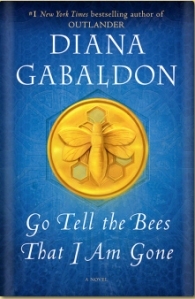 I’ve enjoyed Diana Gabaldon’s “Outlander” series and am just about done reading the latest installment Go Tell The Bees That I Am Gone. I’m enjoying the novel: it has the series’ typically interesting characters, historically accurate themes, and the kind of humor that develops when characters have been together throughout many books. Even so, I’m a bit disappointed in this novel that’s set in North Carolina as the revolutionary war begins. Basically, I think the book has too much backstory almost as though we haven’t read the rest of the series and need to be brought up to date on what’s happened to everyone since the initial novel was published in 1991. The current novel is number nine out of a planned ten books. We need more action in this one.
I’ve enjoyed Diana Gabaldon’s “Outlander” series and am just about done reading the latest installment Go Tell The Bees That I Am Gone. I’m enjoying the novel: it has the series’ typically interesting characters, historically accurate themes, and the kind of humor that develops when characters have been together throughout many books. Even so, I’m a bit disappointed in this novel that’s set in North Carolina as the revolutionary war begins. Basically, I think the book has too much backstory almost as though we haven’t read the rest of the series and need to be brought up to date on what’s happened to everyone since the initial novel was published in 1991. The current novel is number nine out of a planned ten books. We need more action in this one.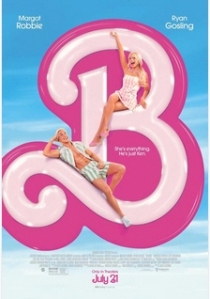 When I first heard about the “Barbie” movie, I assumed it was going to be all fluff like the OLD (1965) “Beach Blanket Bingo” and the 1989-2001 TV series “Baywatch.” What a surprise, “Barbie” is not only doing well at the box office but has gotten some good reviews such as this one on NPR: “‘Barbie’ review: Sometimes corporate propaganda can be fun as hell.” Here’s an excerpt: “Barbie isn’t just a movie that could never fully escape out from under the weight of its artistic compromises. It’s a hoot, a feast for the eyes and ears. Sarah Greenwood’s production design is sensorially astounding; Barbie Land is conceived as it’s appeared in kids’ imaginations for decades – both tangible (plastic shower, toaster, or car) and intangible (invisible water, toast, or motor). The makeup team confidently balances an essence of plasticity without drowning in it to the point of the uncanny. There are musical numbers and A+ cameos. (I’d love to get Lizzo to sing-narrate my life, too, please!)”
When I first heard about the “Barbie” movie, I assumed it was going to be all fluff like the OLD (1965) “Beach Blanket Bingo” and the 1989-2001 TV series “Baywatch.” What a surprise, “Barbie” is not only doing well at the box office but has gotten some good reviews such as this one on NPR: “‘Barbie’ review: Sometimes corporate propaganda can be fun as hell.” Here’s an excerpt: “Barbie isn’t just a movie that could never fully escape out from under the weight of its artistic compromises. It’s a hoot, a feast for the eyes and ears. Sarah Greenwood’s production design is sensorially astounding; Barbie Land is conceived as it’s appeared in kids’ imaginations for decades – both tangible (plastic shower, toaster, or car) and intangible (invisible water, toast, or motor). The makeup team confidently balances an essence of plasticity without drowning in it to the point of the uncanny. There are musical numbers and A+ cameos. (I’d love to get Lizzo to sing-narrate my life, too, please!)”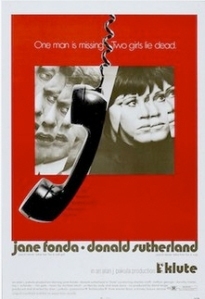 I’ve recorded the 1971 movie “Klute,” a neo-noir thriller that I saw in a theater when it was released, and liked everything about it. I like noir a lot and neo-noir almost as much. I don’t know whether my wife will watch this one with me because she still hasn’t forgiven Fonda for her travels to Vietnam during the war. I haven’t either, but I see the movie as separate from its star’s Oscar-winning performance. According to Wikipedia, “Klute was widely praised by critics for its screenplay and Fonda’s performance, though some criticized Pakula’s unconventional direction. On review aggregator Rotten Tomatoes, Klute holds an approval rating of 93% based on 43 reviews, with an average rating of 8.2/10. The website’s critical consensus reads: ‘Donald Sutherland is coolly commanding and Jane Fonda a force of nature in Klute, a cuttingly intelligent thriller that generates its most agonizing tension from its stars’ repartee.’ On Metacritic, which assigns a rating to reviews, the film has a weighted average score of 81 out of 100, based on 47 critics, indicating ‘universal acclaim.'”
I’ve recorded the 1971 movie “Klute,” a neo-noir thriller that I saw in a theater when it was released, and liked everything about it. I like noir a lot and neo-noir almost as much. I don’t know whether my wife will watch this one with me because she still hasn’t forgiven Fonda for her travels to Vietnam during the war. I haven’t either, but I see the movie as separate from its star’s Oscar-winning performance. According to Wikipedia, “Klute was widely praised by critics for its screenplay and Fonda’s performance, though some criticized Pakula’s unconventional direction. On review aggregator Rotten Tomatoes, Klute holds an approval rating of 93% based on 43 reviews, with an average rating of 8.2/10. The website’s critical consensus reads: ‘Donald Sutherland is coolly commanding and Jane Fonda a force of nature in Klute, a cuttingly intelligent thriller that generates its most agonizing tension from its stars’ repartee.’ On Metacritic, which assigns a rating to reviews, the film has a weighted average score of 81 out of 100, based on 47 critics, indicating ‘universal acclaim.'”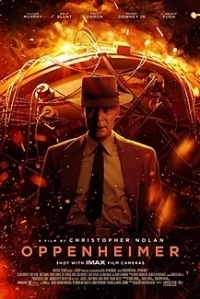 Are you planning to watch “Oppenheimer”? I’m thinking it’s one of those must-see films because it focuses on an important part of our history. Wikipedia writes that “The film was released on the same day as
Barbie
, a fantasy comedy film directed by Greta Gerwig based on Mattel‘s Barbie fashion dolls and media franchise, and distributed by Warner Bros. Due to the tonal and genre contrast between the two films, many social media users created memes about how the two films appealed to different audiences, and how they should be viewed as a double feature. The trend was dubbed “Barbenheimer“. In an interview with
La Vanguardia
, Cillian Murphy endorsed the phenomenon, saying “My advice would be for people to go see both, on the same day. If they are good films, then that’s cinema’s gain.” If I went to a theater to see “Barbie,” I’d have to wear my Batman costume to avoid attracting attention. As for “Oppenheimer,” I’ll probably watch it even though I think the bomb should not have been used against Japan in World War II.
Are you planning to watch “Oppenheimer”? I’m thinking it’s one of those must-see films because it focuses on an important part of our history. Wikipedia writes that “The film was released on the same day as
Barbie
, a fantasy comedy film directed by Greta Gerwig based on Mattel‘s Barbie fashion dolls and media franchise, and distributed by Warner Bros. Due to the tonal and genre contrast between the two films, many social media users created memes about how the two films appealed to different audiences, and how they should be viewed as a double feature. The trend was dubbed “Barbenheimer“. In an interview with
La Vanguardia
, Cillian Murphy endorsed the phenomenon, saying “My advice would be for people to go see both, on the same day. If they are good films, then that’s cinema’s gain.” If I went to a theater to see “Barbie,” I’d have to wear my Batman costume to avoid attracting attention. As for “Oppenheimer,” I’ll probably watch it even though I think the bomb should not have been used against Japan in World War II.
July 22, 2023
I love moonshiners and dislike feds
 I have legal moonshine in the house and think it’s darned good. What amuses me is the fact that some of today’s legal distillers advertise that they’re using the same recipe they used when the family made moonshine illegally. Midnight Moon Moonshine says on its website, for example, that “Midnight Moon is inspired by Junior Johnson’s family moonshine recipe and – true to the roots of moonshine – it is made from 100% American corn and handcrafted in small batches.”
I have legal moonshine in the house and think it’s darned good. What amuses me is the fact that some of today’s legal distillers advertise that they’re using the same recipe they used when the family made moonshine illegally. Midnight Moon Moonshine says on its website, for example, that “Midnight Moon is inspired by Junior Johnson’s family moonshine recipe and – true to the roots of moonshine – it is made from 100% American corn and handcrafted in small batches.”
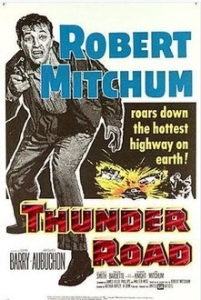 In movies like “Thunder Road,” I always support the moonshiners because I think messing with them is an example of government overreach that began with the Whiskey Rebellion of 1791 when the new federal government taxed booze to pay for the war. My question then, and now, always was how is it fair to tax one product rather than levying a tax on all projects? Not that I would like that any better.
In movies like “Thunder Road,” I always support the moonshiners because I think messing with them is an example of government overreach that began with the Whiskey Rebellion of 1791 when the new federal government taxed booze to pay for the war. My question then, and now, always was how is it fair to tax one product rather than levying a tax on all projects? Not that I would like that any better.
Made in 1958, “Thunder Road” became a cult favorite, especially in parts of the county with a moonshine tradition. When one of my brothers bought some mountain property in North Carolina years ago, he was told that there were probably stills there; just don’t go looking for them.
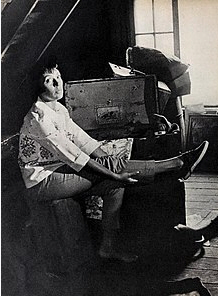 Smith in 1960
Smith in 1960
My wife and I watch the movie from time to time. I like it, except for the ending which I consider as an example of illegal federal force. (Like the ending of “Bonnie and Clyde.”) But aside from that, it’s a bit of nostalgia with Mitchum’s typical natural style of acting and the added benefit of having jazz singer Keely Smith in the cast and singing the theme song “The Whippoorwill.” Mitchum co-wrote the song. Smith is probably best remembered for her song–sung with her husband Louis Prima–“That Old Black Magic.”
In 2012, there was a Thunder Road Festival in Roane County, Tennessee, but I can’t find any mention of it in subsequent years: “One of Tennessee’s fastest growing festivals, Rockwood’s Thunder Road Festival is held each April in downtown Rockwood, TN. The day-long festival captures the element of Rockwood’s past as a location on the notorious Thunder Road.”
And then, of course, there’s NASCAR, but that’s another story.
July 21, 2023
I left my heart in San Francisco
 With the death of Tony Bennett who died today at 96 a small portion of the hearts of those of us who were born in the Bay Area also died because for us his signature song became our signature song and a haunting memory of where we came from and where many family members lived on for years after we left. We went back often during my pre-school years and then I want back later when I was in the Navy and had an apartment in the Mission District down a steep hill from my aunt’s apartment, the place where she lived when I was a child and the place where she still lived when I was stationed acrosss the Bay at the former Alameda Naval Air Station when my ship was in port.
With the death of Tony Bennett who died today at 96 a small portion of the hearts of those of us who were born in the Bay Area also died because for us his signature song became our signature song and a haunting memory of where we came from and where many family members lived on for years after we left. We went back often during my pre-school years and then I want back later when I was in the Navy and had an apartment in the Mission District down a steep hill from my aunt’s apartment, the place where she lived when I was a child and the place where she still lived when I was stationed acrosss the Bay at the former Alameda Naval Air Station when my ship was in port.
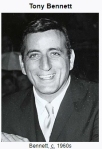 Tony Bennet first sang “I Left My Heart in San Franscisco” in 1961 at the Fairmont Hotel. Perhaps KABL, my favorite SF station was there. I was in Florida then and not a happy camper at being pulled away from California when my father’s job brought us to Tallahassee. In many ways, I never recovered from that that move because the Florida Panhandle, though beautiful in many ways that I learned to love, was just too alien for a kid who thought he’d grow up many miles due west.
Tony Bennet first sang “I Left My Heart in San Franscisco” in 1961 at the Fairmont Hotel. Perhaps KABL, my favorite SF station was there. I was in Florida then and not a happy camper at being pulled away from California when my father’s job brought us to Tallahassee. In many ways, I never recovered from that that move because the Florida Panhandle, though beautiful in many ways that I learned to love, was just too alien for a kid who thought he’d grow up many miles due west.
Sadly, I can never go back. San Francisco became to expensive and, like the state, was totally messed up by the politicians. And yet, Tony Bennett kept the dream of going back alive with that song and with his recording longevity with Lady Gaga and other artists over the years. He was my connection to times gone by. The cord has finally been cut.
July 19, 2023
‘The Borowitz Report’ (not the news)
 “Andy Borowitz (born January 4, 1958)is an American writer, comedian, satirist, and actor. Borowitz is a New York Times-bestselling author who won the first National Press Club award for humor. He is known for creating the NBC sitcom The Fresh Prince of Bel-Air and the satirical column The Borowitz Report.” – Wikipedia
“Andy Borowitz (born January 4, 1958)is an American writer, comedian, satirist, and actor. Borowitz is a New York Times-bestselling author who won the first National Press Club award for humor. He is known for creating the NBC sitcom The Fresh Prince of Bel-Air and the satirical column The Borowitz Report.” – Wikipedia
The Borowitz Report was acquired by the New Yorker Magazine in 2012. Due to the prevalence of fake news claims throughout the country, the New Yorker added the tagline “not the news” in 2016. If you sign up for the newsletter, it arrives in your in-basket with funny satire that you’ll wish you had written.
Today’s satirical story is headlined:
Pence Admits to Spending Entire Campaign Fund on Taylor Swift Ticket and begins, “In an emotional press conference, former Vice-President Mike Pence revealed that he had spent all of his Presidential campaign’s funds on a ticket to Taylor Swift’s Eras Tour.”
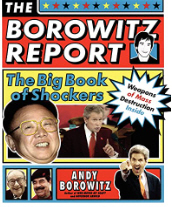 You can also find Borowitz’s satire in book form such as The Borowitz Report: The Big Book of Shockers described by the publisher as “From the man The Wall Street Journal hailed as a “Swiftean satirist” comes the most shocking book ever written! The Borowitz Report: The Big Book of Shockers, by award-winning fake journalist Andy Borowitz, contains page after page of “news stories” too hot, too controversial, too — yes, shocking — for the mainstream press to handle. Sample the groundbreaking reporting from the news organization whose motto is “Give us thirty minutes — we’ll waste it.”
You can also find Borowitz’s satire in book form such as The Borowitz Report: The Big Book of Shockers described by the publisher as “From the man The Wall Street Journal hailed as a “Swiftean satirist” comes the most shocking book ever written! The Borowitz Report: The Big Book of Shockers, by award-winning fake journalist Andy Borowitz, contains page after page of “news stories” too hot, too controversial, too — yes, shocking — for the mainstream press to handle. Sample the groundbreaking reporting from the news organization whose motto is “Give us thirty minutes — we’ll waste it.”
I look forward to the Borowitz report e-mails because they provide welcome smiles amidst the chaos of real news reporting.
–Malcolm
Malcolm R. Campbell’s political satire books are, sadly, out of print.
July 18, 2023
‘Crook Manifesto’ by Colson Whitehead
After writing about Whitehead’s Harlem Shuffle yesterday, I thought I might as well focus on its sequel, Crook Manifesto, which was released today by Doubleday. The book allows Whitehead to continue his focus on Harlem and treat his readers to the characters they got to know in Harlem Shuffle. The books are part of a planned trilogy. I like the Minneapolis Star-Tribune’s comment, “A masterwork of stylish noir and social satire … Whitehead’s larger project propels us forward, probing the whipsaw of race and the ouroboros of virtue and vice.”
From the Publisher
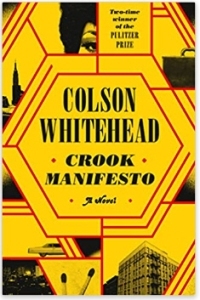 It’s 1971. Trash piles up on the streets, crime is at an all-time high, the city is careening towards bankruptcy, and a shooting war has broken out between the NYPD and the Black Liberation Army. Amidst this collective nervous breakdown furniture store owner and ex-fence Ray Carney tries to keep his head down and his business thriving. His days moving stolen goods around the city are over. It’s strictly the straight-and-narrow for him — until he needs Jackson 5 tickets for his daughter May and he decides to hit up his old police contact Munson, fixer extraordinaire. But Munson has his own favors to ask of Carney and staying out of the game gets a lot more complicated – and deadly.
It’s 1971. Trash piles up on the streets, crime is at an all-time high, the city is careening towards bankruptcy, and a shooting war has broken out between the NYPD and the Black Liberation Army. Amidst this collective nervous breakdown furniture store owner and ex-fence Ray Carney tries to keep his head down and his business thriving. His days moving stolen goods around the city are over. It’s strictly the straight-and-narrow for him — until he needs Jackson 5 tickets for his daughter May and he decides to hit up his old police contact Munson, fixer extraordinaire. But Munson has his own favors to ask of Carney and staying out of the game gets a lot more complicated – and deadly.
1973. The counter-culture has created a new generation, the old ways are being overthrown, but there is one constant, Pepper, Carney’s endearingly violent partner in crime. It’s getting harder to put together a reliable crew for hijackings, heists, and assorted felonies, so Pepper takes on a side gig doing security on a Blaxploitation shoot in Harlem. He finds himself in a freaky world of Hollywood stars, up-and-coming comedians, and celebrity drug dealers, in addition to the usual cast of hustlers, mobsters, and hit men. These adversaries underestimate the seasoned crook – to their regret.
1976. Harlem is burning, block by block, while the whole country is gearing up for Bicentennial celebrations. Carney is trying to come up with a July 4th ad he can live with. (“Two Hundred Years of Getting Away with It!”), while his wife Elizabeth is campaigning for her childhood friend, the former assistant D.A and rising politician Alexander Oakes. When a fire severely injures one of Carney’s tenants, he enlists Pepper to look into who may be behind it. Our crooked duo have to battle their way through a crumbling metropolis run by the shady, the violent, and the utterly corrupted.
CROOK MANIFESTO is a darkly funny tale of a city under siege, but also a sneakily searching portrait of the meaning of family. Colson Whitehead’s kaleidoscopic portrait of Harlem is sure to stand as one of the all-time great evocations of a place and a time.
From the New York Times“Returning to the world of his novel ‘Harlem Shuffle,’ Colson Whitehead’s ‘Crook Manifesto’ is a dazzling treatise, a glorious and intricate anatomy of the heist, the con, and the slow game. There’s an element of crime here, certainly, but as in Whitehead’s previous books, the genre isn’t the point. Here he uses the crime novel as a lens to investigate the mechanics of a singular neighborhood at a particular tipping point in time. He has it right: the music, the energy, the painful calculus of loss. Structured into three time periods — 1971, 1973, and finally the year of America’s bicentennial celebration, 1976 — ‘Crook Manifesto’ gleefully detonates its satire upon this world while getting to the heart of the place and its people.”
July 17, 2023
‘Harlem Shuffle’ by Colson Whitehead
“The twin triumphs of The Underground Railroad (2016) and The Nickel Boys (2019) may have led Whitehead’s fans to believe he would lean even harder on social justice themes in his next novel. But by now, it should be clear that this most eclectic of contemporary masters never repeats himself, and his new novel is as audacious, ingenious, and spellbinding as any of his previous period pieces.” – Kirkus Reviews
This book’s been out a while (August 9, 2022) and Whitehead’s most recent book Crook Manifesto will be released tomorrow, so it’s past time to say something about it. It’s good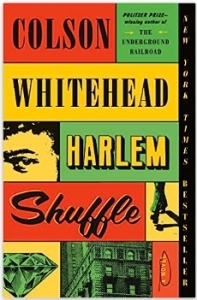 . Actually, it’s better than good. The New York Times calls it “A sizzling heist novel” and the San Francisco Chronicle says it’s “Fast-paced, keen-eyed and very funny.”
. Actually, it’s better than good. The New York Times calls it “A sizzling heist novel” and the San Francisco Chronicle says it’s “Fast-paced, keen-eyed and very funny.”
“Ray Carney was only slightly bent when it came to being crooked…” To his customers and neighbors on 125th Street, Carney is an upstanding salesman of reasonably priced furniture, making a decent life for himself and his family. He and his wife Elizabeth are expecting their second child, and if her parents on Striver’s Row don’t approve of him or their cramped apartment across from the subway tracks, it’s still home.
“Few people know he descends from a line of uptown hoods and crooks, and that his façade of normalcy has more than a few cracks in it. Cracks that are getting bigger all the time.
“Cash is tight, especially with all those installment-plan sofas, so if his cousin Freddie occasionally drops off the odd ring or necklace, Ray doesn’t ask where it comes from. He knows a discreet jeweler downtown who doesn’t ask questions, either.
“Then Freddie falls in with a crew who plan to rob the Hotel Theresa—the “Waldorf of Harlem”—and volunteers Ray’s services as the fence. The heist doesn’t go as planned; they rarely do. Now Ray has a new clientele, one made up of shady cops, vicious local gangsters, two-bit pornographers, and other assorted Harlem lowlifes.
“Thus begins the internal tussle between Ray the striver and Ray the crook. As Ray navigates this double life, he begins to see who actually pulls the strings in Harlem. Can Ray avoid getting killed, save his cousin, and grab his share of the big score, all while maintaining his reputation as the go-to source for all your quality home furniture needs?
“Harlem Shuffle’s ingenious story plays out in a beautifully recreated New York City of the early 1960s. It’s a family saga masquerading as a crime novel, a hilarious morality play, a social novel about race and power, and ultimately a love letter to Harlem.”
 “Arch Colson Chipp Whitehead (born November 6, 1969) is an American novelist. He is the author of eight novels, including his 1999 debut work The Intuitionist; The Underground Railroad (2016), for which he won the 2016 National Book Award for Fiction and the 2017 Pulitzer Prize for Fiction; and The Nickel Boys, for which he won the Pulitzer Prize for Fiction again in 2020. He has also published two books of non-fiction. In 2002, he received a MacArthur Genius Grant.” –Wikipedia
“Arch Colson Chipp Whitehead (born November 6, 1969) is an American novelist. He is the author of eight novels, including his 1999 debut work The Intuitionist; The Underground Railroad (2016), for which he won the 2016 National Book Award for Fiction and the 2017 Pulitzer Prize for Fiction; and The Nickel Boys, for which he won the Pulitzer Prize for Fiction again in 2020. He has also published two books of non-fiction. In 2002, he received a MacArthur Genius Grant.” –Wikipedia
July 16, 2023
Potpourri for 7/16/23
 The first time I had ulcers, the diagnosis, tests, and treatment were handled by a GP. This time, the GP (not the same doctor) turned the whole matter over to a specialist. So now I sit and wait for an August 24th appointment to arrive. This fits a news story I saw on TV that people are experiencing longer wait times getting an appointment with a specialist. Part of the problem is using GPs for intake into the system rather than as a place of treatment. My two cents.
The first time I had ulcers, the diagnosis, tests, and treatment were handled by a GP. This time, the GP (not the same doctor) turned the whole matter over to a specialist. So now I sit and wait for an August 24th appointment to arrive. This fits a news story I saw on TV that people are experiencing longer wait times getting an appointment with a specialist. Part of the problem is using GPs for intake into the system rather than as a place of treatment. My two cents. Now that performers have joined writers, Hollywood is being shut down. As usual, the studios are claiming that the strikers are only hurting themselves. According to Fran Drescher, president of SAG-AFTRA, “I cannot believe it, quite frankly, how far apart we are on so many things. How they plead poverty, that they’re losing money left and right when giving hundreds of millions of dollars to their CEOs. It is disgusting. Shame on them. They stand on the wrong side of history.” I support the strikers in this rare instance of the writers’ and actors’ unions striking at the same time.
Now that performers have joined writers, Hollywood is being shut down. As usual, the studios are claiming that the strikers are only hurting themselves. According to Fran Drescher, president of SAG-AFTRA, “I cannot believe it, quite frankly, how far apart we are on so many things. How they plead poverty, that they’re losing money left and right when giving hundreds of millions of dollars to their CEOs. It is disgusting. Shame on them. They stand on the wrong side of history.” I support the strikers in this rare instance of the writers’ and actors’ unions striking at the same time.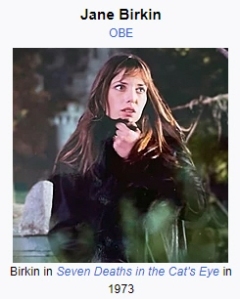 According to USA Today, “Actress and singer Jane Birkin, who inspired fashion-forward Birkin bag, has died at 76.” Frankly, I’m tired of reading news stories about people who are more or less in my generation dying off. According to Wikipedia, “In 2001, Birkin was awarded the OBE. She was also awarded the French Ordre National du Mérite in 2004 and 2015. She won the “Best Actress” award at the 1985 Orleans Film Festival for Leave All Fair. The jury of the 1985 Venice Film Festival recognized Birkin’s performance in Dust as amongst the best of the year but decided not to award the best actress prize because all of the actresses they judged to have made the best performances were in films that won major awards. Dust won the Silver Lion prize. In 2018, she received the Japanese Order of the Rising Sun.”
According to USA Today, “Actress and singer Jane Birkin, who inspired fashion-forward Birkin bag, has died at 76.” Frankly, I’m tired of reading news stories about people who are more or less in my generation dying off. According to Wikipedia, “In 2001, Birkin was awarded the OBE. She was also awarded the French Ordre National du Mérite in 2004 and 2015. She won the “Best Actress” award at the 1985 Orleans Film Festival for Leave All Fair. The jury of the 1985 Venice Film Festival recognized Birkin’s performance in Dust as amongst the best of the year but decided not to award the best actress prize because all of the actresses they judged to have made the best performances were in films that won major awards. Dust won the Silver Lion prize. In 2018, she received the Japanese Order of the Rising Sun.”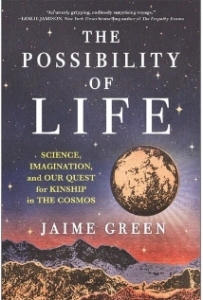 As TNR puts it in “The Tantalizing, Lonely Search for Alien Life” “Scientists disagree about what life on other planets even means. Would we know it when we saw it?” “A truly alien alien is so incomprehensible that stories about them just become stories about human beings,” Jaime Green writes in her new book, The Possibility of Life: Science, Imagination, and Our Quest for Kinship in the Universe.” Maybe our neighbors come from a universe far away. How would we know? Perhaps we think those aliens will look like the Klingons or the Vulcans from “Star Trek.” If so, they wouldn’t blend in very well, would they?
As TNR puts it in “The Tantalizing, Lonely Search for Alien Life” “Scientists disagree about what life on other planets even means. Would we know it when we saw it?” “A truly alien alien is so incomprehensible that stories about them just become stories about human beings,” Jaime Green writes in her new book, The Possibility of Life: Science, Imagination, and Our Quest for Kinship in the Universe.” Maybe our neighbors come from a universe far away. How would we know? Perhaps we think those aliens will look like the Klingons or the Vulcans from “Star Trek.” If so, they wouldn’t blend in very well, would they?–Malcolm
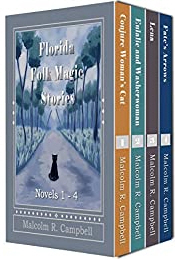 Malcolm R. Campbell is the author of contemporary fantasy, paranormal, and magical realism short stories and novels. The four-book set shown here combines four Kindle novels into one volume at a savings to readers
Malcolm R. Campbell is the author of contemporary fantasy, paranormal, and magical realism short stories and novels. The four-book set shown here combines four Kindle novels into one volume at a savings to readers
July 15, 2023
Sometimes Chef Ramsay is Wrong
I’d probably get thrown off his cooking shows by shouting back at him about some figurative flaw he perceives in my cooking.
 I do not think the default cooking time for steaks should be rare. Ramsay thinks it is. His guest chefs appearing as judges on shows like “Masterchef” also think rare is the only way to cook a steak. I can eat rare steak, but I don’t want to. Medium rare is my preferred choice.On one show, a chef from the South was cooking grits. Ramsay berated her for using water instead of stock. If that had been me, I would have said, “You’re damn right I’m using water because I don’t want my grits to have a chicken or beef stock flavor.” I live in the South. I eat grits a lot. Chef Ramsay comes from the U. K. where few people know how to cook, so he can keep his grits ideas to himself.
I do not think the default cooking time for steaks should be rare. Ramsay thinks it is. His guest chefs appearing as judges on shows like “Masterchef” also think rare is the only way to cook a steak. I can eat rare steak, but I don’t want to. Medium rare is my preferred choice.On one show, a chef from the South was cooking grits. Ramsay berated her for using water instead of stock. If that had been me, I would have said, “You’re damn right I’m using water because I don’t want my grits to have a chicken or beef stock flavor.” I live in the South. I eat grits a lot. Chef Ramsay comes from the U. K. where few people know how to cook, so he can keep his grits ideas to himself. Chef Ramsay hates dried herbs served raw. I love them. I prefer using herbs straight from our garden, and I admit that most of the herbs I use–whether fresh or dried–are cooked. And yet, I love raw dried herbs sprinkled on salads like salt and pepper. Once Ramsay hit the ceiling when a cook topped off a dish with a leaf the size of a bay leaf. Hell, I don’t even do that. What struck me as funny was his warning that nobody likes dried herbs sprinkled on top of food. Ha!On one show, a pregnant woman ordered tuna and it arrived at her table raw. Ramsay went nuts, asking the chef how he could jeopardize a pregnant woman’s life by serving her raw fish. I would have agreed that the dish wasn’t what she expected, but would have added that pregnant women can eat sushi. So there was no health risk involved.Ramsay and other Food Network Chefs frequently claim a dish needs more salt. They’re probably right most of the time. I’d be kicked off these shows with the retort that there are saltshakers on restaurant tables for those who want to use more salt than dieticians recommend.I think my biggest complaint about many of the cooking shows is the chefs’ addiction to the blender. I have a blender. I can’t even remember the last time I used it. Chefs who are contestants on many shows think that a dish isn’t complete unless the primary item is placed on top of pureed something or other. Have these cooks been brainwashed? Why would anyone want a steak or pork chop served on top of pureed cauliflower? Or with a streak of pureed carrots filling up an empty part of the plate?
Chef Ramsay hates dried herbs served raw. I love them. I prefer using herbs straight from our garden, and I admit that most of the herbs I use–whether fresh or dried–are cooked. And yet, I love raw dried herbs sprinkled on salads like salt and pepper. Once Ramsay hit the ceiling when a cook topped off a dish with a leaf the size of a bay leaf. Hell, I don’t even do that. What struck me as funny was his warning that nobody likes dried herbs sprinkled on top of food. Ha!On one show, a pregnant woman ordered tuna and it arrived at her table raw. Ramsay went nuts, asking the chef how he could jeopardize a pregnant woman’s life by serving her raw fish. I would have agreed that the dish wasn’t what she expected, but would have added that pregnant women can eat sushi. So there was no health risk involved.Ramsay and other Food Network Chefs frequently claim a dish needs more salt. They’re probably right most of the time. I’d be kicked off these shows with the retort that there are saltshakers on restaurant tables for those who want to use more salt than dieticians recommend.I think my biggest complaint about many of the cooking shows is the chefs’ addiction to the blender. I have a blender. I can’t even remember the last time I used it. Chefs who are contestants on many shows think that a dish isn’t complete unless the primary item is placed on top of pureed something or other. Have these cooks been brainwashed? Why would anyone want a steak or pork chop served on top of pureed cauliflower? Or with a streak of pureed carrots filling up an empty part of the plate?I’ll admit that I like rustic, earthy cooking. Even so, I think celebrity chefs often go too far out on the edge of nonsense.
–Malcolm
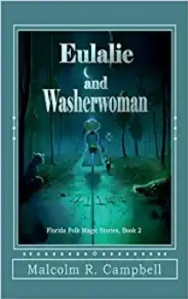 Malcolm R. Campbell is the author of magical realism novels set in the Florida Panhandle of the 1950s.
Malcolm R. Campbell is the author of magical realism novels set in the Florida Panhandle of the 1950s.
July 14, 2023
‘Noir City Magazine’ from the Film Noir Foundation
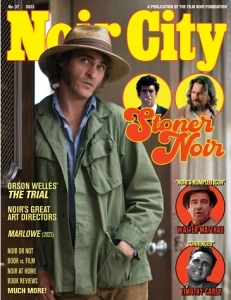 This digital magazine for supporters of the Film Noir Foundation (FNF) is a must for those who love noir films, actors, actresses, and directors. It comes out as a PDF file every four months for those supporting with a donation of $20 or more. A hard copy version is available for anyone on Amazon for $14.99 per issue. Back issues of the digital edition are available on the FNF website and are displayed with a full table of contents showing everything in the issue. Back issues are $5.99 each.
This digital magazine for supporters of the Film Noir Foundation (FNF) is a must for those who love noir films, actors, actresses, and directors. It comes out as a PDF file every four months for those supporting with a donation of $20 or more. A hard copy version is available for anyone on Amazon for $14.99 per issue. Back issues of the digital edition are available on the FNF website and are displayed with a full table of contents showing everything in the issue. Back issues are $5.99 each.
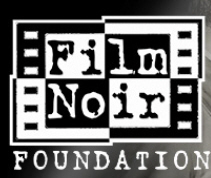 “The Film Noir Foundation is a registered 501(c)(3) non-profit public benefit corporation created as an educational resource regarding the cultural, historical, and artistic significance of film noir as an international cinematic movement.
“The Film Noir Foundation is a registered 501(c)(3) non-profit public benefit corporation created as an educational resource regarding the cultural, historical, and artistic significance of film noir as an international cinematic movement.
“It is our mission to find and preserve films in danger of being lost or irreparably damaged and to ensure that high-quality prints of these classic films remain in circulation for theatrical exhibition to future generations.
“That’s the high-toned legalese. Here are the facts: Even as the high-tech revolution lets us own vast film libraries on DVD, the risk grows greater all the time that 35mm prints of some films will fall into disuse and eventually disintegrate—especially lesser-known titles that have slipped through the cultural cracks, but are worthy of rediscovery.”
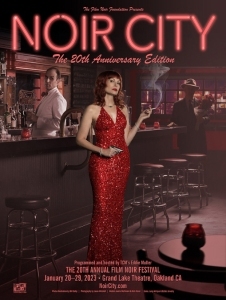 In addition to the magazine and a hosted presentation of noir films on Saturdays on Turner Classic Movies (TCM), the foundation has presented the Noir City film festival in Sa Francisco since 2003. According to the Foundation, the festival “immediately grew into the largest film noir-specific annual event in the United States, the centerpiece of the Film Noir Foundation’s public awareness campaign. Viewers are drawn every January from all over the world, eager to submerge themselves in an extravaganza of rare films, special guests, music, and literary tie-ins — a communal celebration of all things noir.” Shown here is the poster for this year’s festival. It certainly captures the ambiance of noir.
In addition to the magazine and a hosted presentation of noir films on Saturdays on Turner Classic Movies (TCM), the foundation has presented the Noir City film festival in Sa Francisco since 2003. According to the Foundation, the festival “immediately grew into the largest film noir-specific annual event in the United States, the centerpiece of the Film Noir Foundation’s public awareness campaign. Viewers are drawn every January from all over the world, eager to submerge themselves in an extravaganza of rare films, special guests, music, and literary tie-ins — a communal celebration of all things noir.” Shown here is the poster for this year’s festival. It certainly captures the ambiance of noir.
 Noir films are on my mind today since my wife and I just watched the 1946 “murder-in-a-locked-room film called “The Verdict” starring Sydney Greenstreet and Peter Lorre in one of their nine film pairings. The film is dark and filled with shadows and a plot that leaves you guessing until the end. What’s not to like?
Noir films are on my mind today since my wife and I just watched the 1946 “murder-in-a-locked-room film called “The Verdict” starring Sydney Greenstreet and Peter Lorre in one of their nine film pairings. The film is dark and filled with shadows and a plot that leaves you guessing until the end. What’s not to like?
Readers will find a splash or noir in most of my books.




